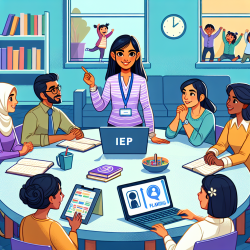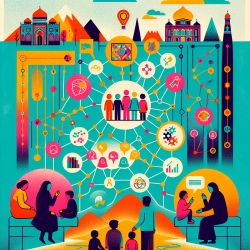Improving Practitioner Skills Through Research: Key Findings from Section I: Oral Sessions
In the pursuit of enhancing child outcomes, it is crucial for practitioners to base their decisions on robust data and evidence. This blog post delves into key findings from the research article titled Section I: Oral Sessions from the Journal of Urban Health, providing insights that can be directly implemented in practice or encourage further research.
1. The Role of Parental Monitoring and Neighborhood Poverty in Youth Violence
One significant study highlighted in the article examines the interplay between parental monitoring, neighborhood poverty, and youth violence. The research, conducted on 1,796 public school children in Baltimore, Maryland, found that:
- Youth in high-poverty neighborhoods are more likely to engage in violent behavior.
- Effective parental monitoring reduces the risk of youth violence, regardless of neighborhood poverty levels.
Practitioners can leverage these findings by developing programs that enhance parental monitoring skills, particularly in high-poverty areas, to mitigate youth violence.
2. Health eTouch: Enhancing Risk Screening in Urban Clinics
The Health eTouch study evaluated a computerized risk screening tool used in urban primary care clinics. Key findings include:
- Immediate feedback to clinicians from computerized screenings significantly improves the recognition of risks and subsequent mental health care.
- Patients generally report high satisfaction with the computerized screening process.
Practitioners can adopt similar technologies to streamline risk assessments and improve patient outcomes in busy urban clinics.
3. Community Partnerships for Maternal and Child Health in Slum Areas
A study on slum communities in Indore, India, highlights the success of community partnerships in improving maternal and child health. Key strategies included:
- Organizing community groups to identify and support families with pregnant women and infants.
- Building linkages with public and private health providers to ensure service delivery.
Practitioners can foster similar community-based approaches to enhance health service delivery in underserved urban areas.
4. Urban Gardening: A Tool for Youth Development
Urban gardening has emerged as a promising intervention for youth development, particularly in inner-city areas. Research findings suggest that:
- Gardening programs can improve academic achievement, physical activity, nutrition, and life skills among youth.
- There is a need for larger-scale research to fully understand the impact of gardening programs.
Practitioners can incorporate urban gardening into their programs to foster holistic development in children and adolescents.
5. Addressing Gender Differences in Adolescent Health
A study on gender differences in dating violence and relational aggression among urban adolescents found that:
- Relational aggression and community violence are significant predictors of dating violence among girls.
- For boys, family violence and age are more critical predictors.
Practitioners should tailor interventions to address these gender-specific risk factors, promoting safer and healthier relationships among adolescents.
Conclusion
These findings underscore the importance of data-driven approaches in enhancing child outcomes. Practitioners are encouraged to integrate these insights into their practice and consider further research to continue improving the effectiveness of their interventions.
To read the original research paper, please follow this link: Section I: Oral Sessions.










